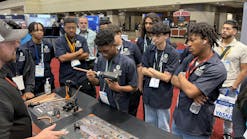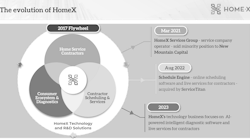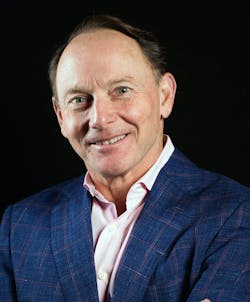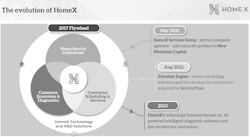Some of the most unnecessary waste borne by heating and air conditioning businesses are the dispatching misadventures that might have been prevented by an advanced understanding of the HVAC customer’s comfort problem.
Customer callbacks alone – those return visits to solve problems caused by technicians not having the right parts or tools, or by an occasional oversight – have been estimated by HVAC consultants to cost HVAC businesses between $500 to $700 per incident, so eliminating additional needless “truck rolls” makes lots of sense for both customers and contractors.
Technology has again come to the rescue, this time to provide more efficient dispatch operations, and tech expert/business dynamo Michael Werner is one of the heroes providing that solution.
That technology – HomeX Intelligent Diagnostics – powered by ChatGPT and artificial intelligence, is at this writing being used by several thousand technicians across the country. The artificial intelligence of HomeX diagnoses problems before service technicians are dispatched. This foreknowledge accelerates repairs and ensures contractors have the right parts and tools. The software can facilitate virtual or in-person services. Its tool — “Remote Assist” — allows technicians to diagnose problems via phone, video or chat. It may also eliminate the need for low-value truck rolls through a consumer self-help function, resulting in happy clients and more productive techs. There is also a version that customer service agents can use when working with residents.
The HomeX Group is a home services platform that marries technology and field services operations. It provides home repair and maintenance services through its service network and a technology platform for providers. HomeX was founded by Werner and other service business experts in 2017, and is headquartered in Chicago.
Prior to starting HomeX, Michael Werner rose through the ranks over 14 years to become president of the very familiar Werner Ladder Co., a family operation that exists to this day. After helping to grow the business to over $500 million, he led a sale to private equity and the family retained a minority ownership stake. Werner hoped to take the company public and exit his financial partners, but the economy and markets did not match up with his dream of international expansion and a public offering. He stepped down from the ladder business in 2001, after disagreeing with his financial partners who wanted to sell the business to a Fortune 1000 conglomerate.
In 2002 Werner was named president and CEO of Globe Union Group, which became the parent company of Danze, Inc. and Gerber Plumbing Fixtures. During Werner’s involvement, Globe Union went from $100 million to over $700 million in revenue.
Time for a Change
In 2012, after six miserable years of a literal depression in the housing market, Werner came to believe that technology could be an essential part of rebuilding the construction and service industries, an opinion he shared in the keynote speech at the 2012 International Kitchen and Bath Show.
His message at that show: build new technology for the industry and leverage relationships to fundamentally make it better for the contractor, designer, builder, distributor, manufacturer, and ultimately, the consumer. “I looked at the industry and said, ‘the industry is broken, and we need to do things differently,’” Werner shared, in an exclusive interview with Contracting Business. His goal was to build tech-enabled service businesses, with networks established between the different industry players, all of whom would be valued; there would be no pawns in this game. And to make it work he wanted to help both contractors and consumers.
“To illustrate this idea, I created a ‘flywheel’ that had three parts,” explained Werner (see graphic). “One part was to build technology for contractors. The second was to build technology for consumers, to help them run their homes better; and the third was to be able to self-perform some of the work and have our own boots on the ground in certain markets. I wanted to do it all carefully because I didn’t want to compete with any other contractors. I wanted to sell the technology to any contractor, even in those regions where we had our own boots on the ground.”
We built each part of the flywheel to be stand-alone, with its own management team and structure. We also knew that at some point it might make sense to sell the technology companies to larger players, and in fact, in 2022 HomeX sold its Schedule Engine division to ServiceTitan.
In the HomeX Services division, the major ‘partnerships’ as Werner calls them, are with Gem Plumbing & Heating, Lincoln, RI; Haller Enterprises, Lititz, PA and Universe Home Services, Seaford, NY. Each company has made several add-on acquisitions, and the 14th partnership is expected to close in December 2023.
In March 2021, New Mountain Capital chipped in $80 million for a minority stake in the HomeX Services business. New Mountain Capital’s entry into the mix was a significant step in the development of HomeX Services.
“There were many things that we were doing really well, but many we could do a lot better with the right partner. And our entire approach has not changed. By bringing New Mountain in as a partner, they’ve helped us recruit at the senior level, and improve our operating systems, marketing and finance. It’s wonderful to have a great business partner to help you really grow a business. This business has accelerated beautifully and will continue to grow organically and through new partnerships over the next couple of years.”
Werner said the financial boost HomeX received from New Mountain’s involvement, combined with the advantages of HomeX technology were further enhanced by three differentiations in his business philosophy.
“One is that I come from a family business background and love what makes them different. Second, my core value is to be a positive force, so that as we build our business, we still care,” Werner explained. Third is my belief in “the rule of three.’ Three points make a plane. Point and counterpoint cross each other out. But if you have three major points, that’s usually enough to win. Our three points are that we work in multiple segments (residential, commercial and mechanical), provide multiple services (HVAC, plumbing and electrical) and operate with an integrated light Center of Excellence structure. As a result, we’re different than most companies out there that acquire small, $5 million to $15 million service companies, and just apply a playbook, and expect the playbook to do everything. We are busy building a ‘great’ business.”
Major Influences
Michael Werner was born in Canada and raised in Chicago. He earned a bachelor’s degree at Stanford University, and after college worked as an English teacher in Taiwan and then served with the US Embassy and the International Rescue Committee in Thailand, helping to resettle Cambodian refugees. It was an education in the good and the bad of human nature.
“I saw firsthand how pernicious communism and the Marxist ideology were, and how the Cambodians, who were just beautiful people, saw a quarter of their countrymen murdered in the name of ideology. It had a real impact on me and how I think about life and democracy, and how important democracy is, and the importance of being a ‘positive force.’”
Werner then returned to Stanford and earned a master’s degree in Engineering Management and then moved to New York as a mergers and acquisitions specialist for Goldman Sachs.
“The M&A world was just getting going again, after two back-to-back global recessions and it was fun to be a young person,” Werner recalled. “And they were so busy. I was working a hundred hours a week, drinking from a fire hose and loving every minute of it.”
His desire to raise a family in California with his wife Laura sparked their move back to the West Coast, where Werner worked for four years for one of his Goldman Sachs clients.
Werner’s 14 years with the family’s Werner Ladder business was a natural next step. There, an uncle shared the philosophy of turning negatives into positives, and weaknesses into strengths. Werner also learned the immense value of meeting with customers, during many miles of driving around Southern California to visit electricians, plumbers and HVAC technicians as a route salesperson. He progressed to be Western region manager, national accounts manager, VP sales & marketing and ultimately president.
“Working with contractors gave me a great appreciation for them. It ties into my appreciation and respect for people who work with their hands. And I coupled that with what I gained from my grandfather, who served in the First and Second World Wars. In WWII he was a 50-year-old Lt Colonel who would climb up rope ladders on the sides of troop ships.”
Well-equipped with myriad life lessons, vast business experience and his own brand of positivity, Werner proceeded to start the company he believed would bring technology to the rescue of the champion of service industries: the technicians.
“One of the core things I said I want our company to do, is to absolutely put technicians on a pedestal. In the HomeX Services division, our objective is not to be the best place to work. I want us to be the only place where people want to work. To take such great care of our people that they wouldn't think of working anywhere else, and to inspire them to recruit other people to work for us. And it really has worked, because our retention rates are between 80 and 90+ percent, in an industry where retention is usually 50 percent. That’s because we have done such good work to take care of our people and have come to be the only place where they want to work. To help do that, we're building out what we call a “center of excellence” approach, and by building on what each company had in place.”
Werner said the “center of excellence” approach is built upon best practices so that company leaders can focus on what matters most in each company. And he loves that most of the centers are led by leaders that were already working in the partnership businesses.
“The key areas where we're doing that are in each company are sales and marketing, supply chain, finance, human resources, M&A, and more,” Werner said. “I’ve yet to find an HVAC company president who wants to spend his days doing accounting.”
In January: A look at the inner workings of the HomeX Service Division process.












